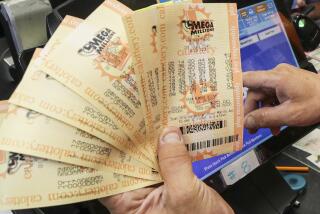Joining Big Lottery Questioned
- Share via
SACRAMENTO — Mega Millions -- the 11-state game with bigger jackpots and steeper odds than California’s SuperLotto Plus -- will launch next week despite a new legal opinion concluding that the California Lottery lacks authority to join such a game, officials said Wednesday.
Tickets are expected to go on sale June 22 despite a legislative counsel opinion that says no provision of the 1984 initiative that created the California Lottery allows it to join a multi-state or international lottery.
For the record:
12:00 a.m. June 17, 2005 For The Record
Los Angeles Times Friday June 17, 2005 Home Edition Main News Part A Page 2 1 inches; 39 words Type of Material: Correction
Multi-state lottery -- An article in Thursday’s California section about the California Lottery joining a multi-state game called Mega Millions said the drawings would be held on Tuesdays and Thursdays. The drawings will be held on Tuesdays and Fridays.
State Sen. Dean Florez (D-Shafter), who asked legislative attorneys to study the issue, said the Lottery should delay the Mega Millions kick-off until the Legislature votes by a two-thirds majority to join the Atlanta-run lottery game.
But Lottery Director Chon Gutierrez said the attorney general’s office has scrutinized California’s agreement with Mega Millions and found no violation of state law.
“We are very, very confident in the opinion from the attorney general,” said Gutierrez. “I signed that document [joining Mega Millions] only after I was given assurance that it was consistent with state law.”
Although Florez said he would not try to stop the launch of Mega Millions, the difference of opinion among state lawyers could encourage someone else to file a lawsuit seeking an injunction.
“It’s definitely a viable option,” said Fred Jones, an Auburn attorney representing the California Coalition Against Gambling Expansion. A preferable option, he said, would be for the Legislature to debate the issue.
Three appointees of Gov. Arnold Schwarzenegger to the lottery commission voted in February, after little public discussion, to join Mega Millions.
“Our policymakers should be the ones setting this decision, not appointed regulators,” said Jones. “This is something that our accountable elected representatives need to decide, because it will greatly impact our state, it could impact our school system.”
Lottery officials predict that Mega Millions’ bigger jackpots -- generated because so many more players would be participating -- will boost California Lottery sales by $300 million to $500 million a year. By law, at least 34 cents of every dollar spent on a lottery ticket in California must go to public education, Gutierrez said.
Last year the California Lottery reached record sales of nearly $3 billion and transferred more than $1 billion to public schools.
But lottery leaders say players are waiting for increasingly bigger jackpots to play, and Mega Millions will help counteract such “jackpot fatigue” by generating jackpots of $200 million or more an average of more than four times a year.
In comparison, the California Lottery’s SuperLotto Plus reached its record $193 million jackpot in 2002.
The legislative counsel, a nonpartisan office that drafts legislation and issues legal opinions at the request of lawmakers, concluded that no provision of the Lottery Act, which voters passed in 1984, allows for a multi-state lottery. And other provisions of the act forbid the Lottery from relinquishing operation and administration to a private entity.
Gutierrez said the legislative counsel made several wrong assumptions about the Lottery’s arrangement with Mega Millions. Key operations would not be out of California’s control, he said.
For example, he said, the Lottery plans to fly a worker to Atlanta each week to watch the Tuesday and Thursday drawings of winning numbers and to hire an independent accounting firm in Atlanta to help oversee Mega Millions’ operations.
The weekly duty in Atlanta would be rotated among staff, said Gutierrez, until a system can be set up that would allow the California Lottery to monitor drawings by video in Sacramento.
Nathan Barankin, spokesman for Atty. Gen. Bill Lockyer, said the legislative counsel wasn’t able to review the agreement itself and assumed wrongly that the Mega Millions organization is private. In fact, he said, it is a public entity and its bylaws say that every state that participates can only do so in a way that does not violate its own state laws.
More to Read
Sign up for Essential California
The most important California stories and recommendations in your inbox every morning.
You may occasionally receive promotional content from the Los Angeles Times.













